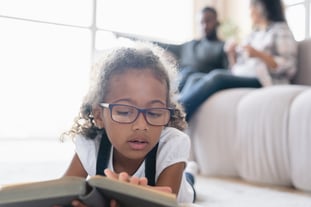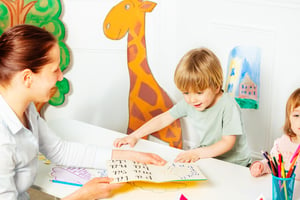Literacy, at its simplest, involves learning sounds and how they connect to make words—and how those words form the basis of language. As children become more literate, they can communicate more effectively and with more confidence.
In fact, one of Ohio's main goals is to improve student outcomes through early literacy. Ohio is focusing on early literacy because research indicates that it predicts academic success, school completion, and readiness for both college and a career.
Applying some best practices in early literacy can reap many rewards, so let's take a look at some of the benefits that a good early literacy program can provide.
Neurological Benefits of Early Literacy
When you read to your young children, you’re helping them develop their brains, according to a nonprofit agency that focuses on creating bright futures for children. Their brains develop most quickly during their first five years of life and reading aloud to strengthens emotional ties between children and parents. These connections serve as the foundation for future learning and intellectual ability.
focuses on creating bright futures for children. Their brains develop most quickly during their first five years of life and reading aloud to strengthens emotional ties between children and parents. These connections serve as the foundation for future learning and intellectual ability.
Early Literacy Provides Educational Benefits
A school readiness program shares how early literacy helps children to develop their vocabulary. By comparing children having quality literacy experiences with those without those experiences, there can be a 30-million-word gap—meaning the number of words they’ve heard—by the age of three. This puts the children with early literary exposure in a better position in kindergarten and beyond. These children will have the foundation they need to read, learn, and express themselves.
Best Practices In Early Literacy
 The National Association for the Education of Young Children shares a related benefit we might not consider. As children receive early exposure to reading from books, they learn how print appears in their language. When English is the language, for example, children learn that books and other materials are read from front to back. You start at the left-hand side of the page and read toward the right from the top to the bottom. Children learn what ‘titles’ and ‘authors’ are, along with other elements of reading.
The National Association for the Education of Young Children shares a related benefit we might not consider. As children receive early exposure to reading from books, they learn how print appears in their language. When English is the language, for example, children learn that books and other materials are read from front to back. You start at the left-hand side of the page and read toward the right from the top to the bottom. Children learn what ‘titles’ and ‘authors’ are, along with other elements of reading.
Early Literacy Develops Social-Emotional Skills
When children develop language skills, Penn State University explains, this can enable them to better share their feelings. They have words to describe how they feel. Because of this ability, early literacy can help children to develop in positive ways, emotionally and socially, and can reduce the number of behavior challenges they may have.
More Best Practices in Early Literacy Skills
Empowered Parents shares fifty ways to help your children develop early literacy, ways that you can incorporate into your daily life. Here is a sampling of them:
- Regularly have conversions with your child. You could ask them about their day and share insights into yours. You
 could go on a walk and talk about what you see.
could go on a walk and talk about what you see. - Read stories and ask your child to retell a story. This will engage them in the story in a fun and imaginative way. You could also ask your child what he or she thinks would happen next in the story (after the book ends).
- Let your child see you reading books. Be a role model for reading and enjoying the process.
- Bake cookies in the shapes of letters and have conversations about what they are as you enjoy cookies and milk together.
In short, have fun while encouraging literacy!








